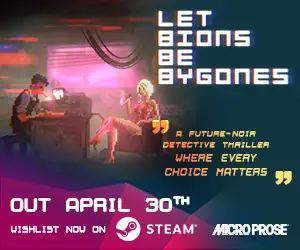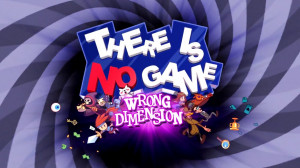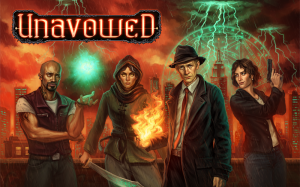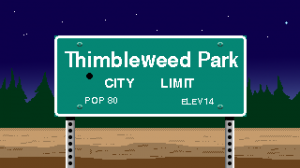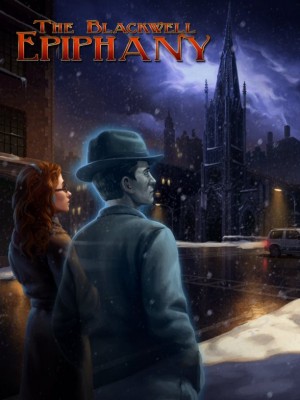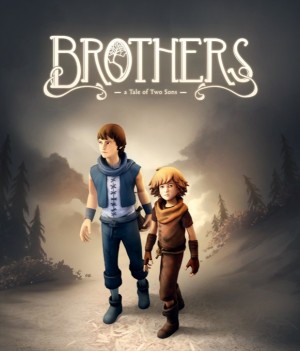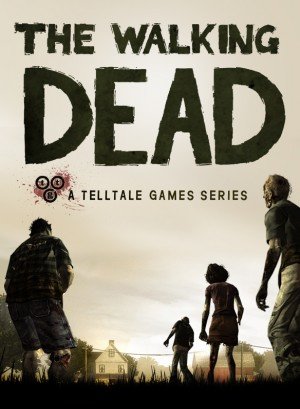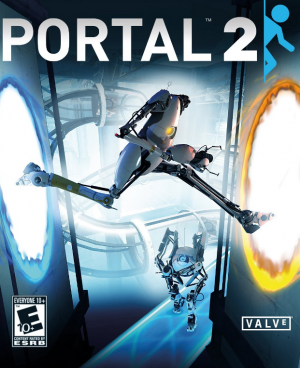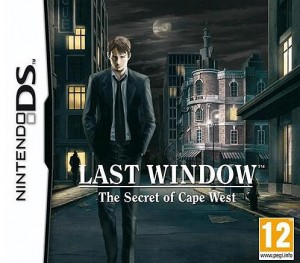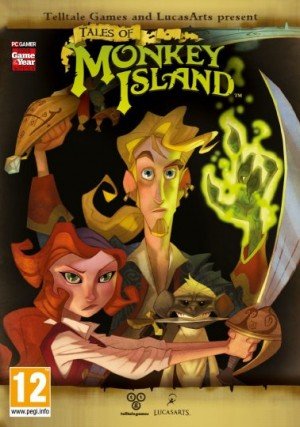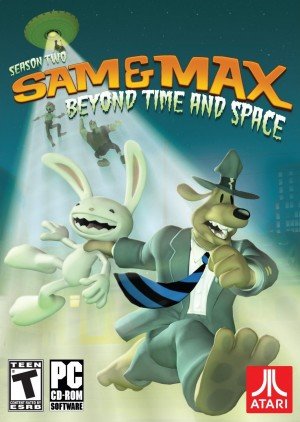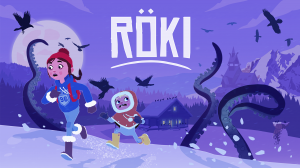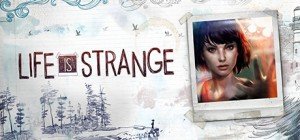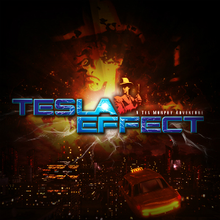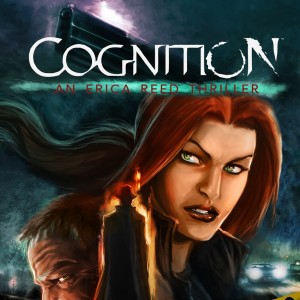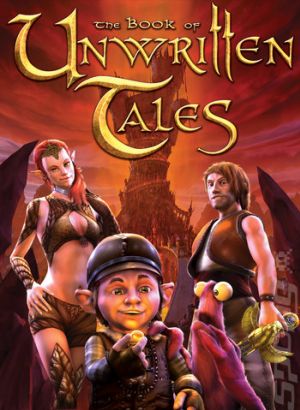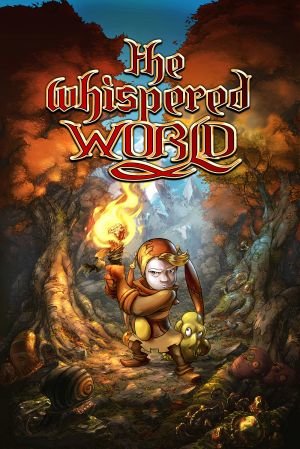Best Adventure Game of the YearAggie Award Winners

With so many deserving candidates in the individual Aggie Award categories, the competition for the ultimate prize each year is always fierce. But in the end there can be only one: the best of the best, the last game standing, the winner of the Aggie Award for Adventure Game of the Year!
» Aggie Awards - category overview
The Aggie award winners:
There Is No Game: Wrong Dimension (2020 winner)
There can be no winner of Best Adventure this year, because there is no game to win it (at least, not in this dimension). We want to further recognize an astoundingly creative experience that manages to upend all expectations of not only adventure games but other genres as well, while still largely working within the familiar point-and-click framework we all know and love. We’d like to further applaud one of the most memorable characters to ever grace the virtual screen – at least in delightfully, if unidentifiably accented voice – who hilariously attempts to obstruct player progress every step of the way. We wish nothing more than to shower admiration on a gam… errr, thing unlike any other, which gleefully eschews all known conventions and creates its own rules as it goes along, weaving in and out of established reality.
But, we can’t. Unless… Draw Me A Pixel’s revolutionary tour de force really is a game after all. Despite its narrator’s amusingly impassioned protestations to the contrary, it manages to provide a good six hours of thoroughly original, nonconformist fun, with puzzles so clever, so unusual that they’ll require all your wits, plenty of experimentation, and a willingness to forget everything you thought you knew to solve. There’s even a hint system to help you out, which surely no non-game would include. So yes, on further reflection, we’ll stand by our assertion that this is not only very much a game, it’s the cream of the crop among 2020 adventures. For being such a bold, brilliant, and surprising burst of pure, unbridled entertainment in a year that so desperately needed a breath of fresh air, There Is No Game: Wrong Dimension is the winner – however reluctantly – of our top Aggie Award.
2020 winner of:
2020 Readers Choice' winner of:
Outer Wilds (2019 winner)
Some games follow well-trodden paths, while others branch out to varying degrees. But very rarely does one allow players to forge their own course as flexibly as Mobius Digital’s Outer Wilds. Placing you in the role of a Hearthian astronaut, you have a whole star system available to explore in your rickety, makeshift steampunk-esque ship. Traveling between planets, moons, space stations and comets, you must piece together the mystery of how to save it all…in only 22 real-time minutes. It’s space exploration meets Groundhog Day, as after the allotted time the sun goes supernova and you are dropped back on your home planet for another attempt. And another, and another…
Exploration and discovery are at the heart of the experience as you interpret clues left by an ancient alien race in a desperate dash to protect your people, all the while dodging the dangers of space travel like supersized alien angler fish, sandstorms, oxygen depletion, and even just falling from great heights. With high production values, a compelling time-loop concept with incredible freedom to explore what you want and when, along with dynamically changing worlds beyond what’s been seen in adventures before, it’s really no wonder Outer Wilds managed to leave even the toughest of competitors behind to claim the year's top Aggie Award as Best Adventure of 2019.
2019 Readers Choice' winner of:
Unavowed (2018 winner)
Dave Gilbert is no stranger to the Aggies, having earned top honours in 2014 for The Blackwell Epiphany. But it’s one thing to cap off a popular five-part series with a triumphant final act, and quite another to start all over again with a new story and new cast, and make it bigger and more ambitious than any game the little indie studio had ever made before. So it was no sure bet that Unavowed would be able to follow in its acclaimed predecessor’s footsteps. Fortunately, even with such big shoes to fill, the new game not only fully measured up to our expectations, but surpassed them in virtually every way.
Really we shouldn’t be THAT surprised, as Wadjet Eye has become synonymous with thoughtful, highly-polished adventures, and for everything new in Unavowed, there are more than enough familiar studio trademarks to ensure another success. The production values are all top-notch, from the gorgeous pixel art by Ben Chandler and Ivan Ulyanov, to another brilliant score by Thomas Regin, to the usual superb voice acting from the entire cast. The game’s previous Aggies speak to the quality of its story and writing, delivering a compelling modern supernatural fantasy filled with ghosts, demons, mages, mer-people and more, and infusing it with an entire team of believable, richly-developed protagonists. Those alone would put it in any game-of-the-year conversation.
The accomplishments don’t stop there, however, as Unavowed took an already winning formula and went above and beyond, with a choice of male and female lead characters, branching narrative paths, genuinely thought-provoking moral quandaries, and three entirely different backstories to choose from, providing a welcome degree of replayability. On top of an already impressive achievement, it all adds up to a thoroughly engaging adventure you can experience more than one way, each of them equally valid and every bit as rewarding. It took a lot to beat out the innovative Return of the Obra Dinn (and others) for the top award of 2018, but Unavowed shone in every respect, earning the developer its second Best Adventure Aggie to put on the mantel.
So, Wadjet Eye, no pressure or anything, but what’s next?
2018 winner of:
Thimbleweed Park (2017 winner)
Thimbleweed Park
They just don’t make ‘em like they used to… sometimes when they try, they make ‘em even better.
More than three decades ago, a couple of unknown dudes named Ron Gilbert and Gary Winnick teamed up at Lucasfilm Games to make a multi-character, puzzle-filled, non-linear adventure, and created a whole new verb-based, point-and-click control scheme named for the game (the SCUMM acronym stands for Script Creation Utility for Maniac Mansion). Like many innovators, the result wasn’t nearly as refined as others would go on to be, but the game seriously reshaped what adventure games could be and helped usher the genre into its Golden Age of popularity.
But that was then and this this is now, and never the twain shall meet, right? Well, hold on. Thanks to the (rapidly fading) miracle of Kickstarter, in 2014 Gilbert and Winnick reunited at long last for another adventure called Thimbleweed Park. Slyly promising “the best adventure game you never played in 1987,” it was to be a pure throwback in most respects, yet updated with current features. The ultimate goal was to not only give players the same experience they had back then, but the experience they remember having.
Bold claims… and yet that’s exactly what they delivered! Thimbleweed Park truly feels like a return to the genre’s halcyon days. At a time when most adventure are getting shorter and simpler and increasingly streamlined, Gilbert and Winnick unapologetically created a substantial, highly amusing player experience with rich interaction, expansive open-world environments to explore, overlapping objectives, a multi-layered murder mystery to uncover, unique characters both to play as and converse with, and a serious lack of hand-holding in solving the many puzzles encountered. A few rough edges aside, this is point-and-click adventure gaming, baby!
Fortunately, the designers didn’t go back 30 years technologically. Sure, the game is still presented in a deliberately retro style, but these ain’t your parents’ pixels. The artwork is beautiful here in all its high-resolution glory, the many environs generously animated along the way. The various voices are wonderfully performed and the score is diverse, seamlessly transitioning to enhance the different atmospheres in this unsettling town and its ever-dwindling population of 80.
Thimbleweed Park isn’t a perfect game – what game is? – but there’s really nothing it doesn’t do well. (It may not have won many of the previous individual staff awards, but it seriously contended for most!) We’re very conscious here at Adventure Gamers of NOT over-glorifying a rose-coloured past, but this game would have stood proudly among its SCUMM-era peers – not all the way back to the hardware-challenged 1987, but rather the beloved classics from the early to mid-‘90s. Here in 2017, it’s a welcome nostalgic experience that nevertheless manages to put most of its modern contemporaries to shame. There were definitely some great competitors, but for successfully making everything old (school) new again, Thimbleweed Park earns this year’s top Aggie Award for Best Adventure.
2017 winner of:
King’s Quest (2015/2016) (2016 winner)
When it was first announced that the King’s Quest series was being revived, under the old Sierra label no less, our first reaction was “all riiiiight!!” Once the initial enthusiasm wore off, however, the trepidation set in: just how faithful would this “reboot” be in the hands of The Odd Gentlemen, a team best known for its puzzle-platformer The Misadventures of P.B. Winterbottom, under the publishing umbrella of Activision, a company that’s shown little appreciation of the genre legacy it inherited. Would this really be King’s Quest? And what’s the deal with making it episodic? Would it even be an adventure game? Could this end up actually tarnishing the image of a cherished franchise? (The adventure community is a notoriously pessimistic lot, after all.)
Thankfully, as we all now know, any such concerns were entirely unfounded. The developers turned out to be devoted fans of the classic games of yesteryear, and their commitment to preserving its heritage while building on its lore and giving it a new spin with an updated look is plainly evident throughout. It’s rare to think of anything but the smallest, most personal indie adventures as “labours of love”, but that’s the sense this reimagined series conveyed. It was even given the Williams’ seal of approval! And now it’s been given ours, as we recognize King’s Quest as our Best Adventure of 2016.
A cynic might argue that this is nothing but rose-coloured nostalgia. But no, it really isn’t. Certainly the new King’s Quest isn’t a perfect game. (Then again, none are.) Some episodes are more enjoyable than others, and yet we applaud the effort to give each of the five chapters its own distinct story, time period and gameplay focus. This is one of the few episodic series, if not the only one so far, to genuinely justify its episodic approach by making each chapter uniquely different. And when taken as a whole, it’s a thoroughly worthwhile return to the Kingdom of Daventry.
From the lavish cel-shaded graphics to the finely-tuned soundscape; from the corny wordplay and zany shenanigans to the surprisingly moving present day story framing the playable flashback adventures, in a way it felt like we’d never left. The fun-loving and pun-loving Graham, of course, is a delightful protagonist throughout the various decades, and all along his lifelong journey he encounters a host of enchanting characters and puzzles, puzzles galore. (And we sure can’t say THAT about a lot of adventure games these days!)
Sure, the many callbacks to King’s Quests of yore let us bask in the warm glow of sweet reminiscence. But this is a thoroughly modern take on the royal family’s adventures, and manages to stand out entirely on its own merits. For so successfully entertaining us with its wonderful blend of old and new, our most distinguished Aggie Award for Best Adventure this year becomes the latest feather in this grand series’ cap.
2016 winner of:
2016 Readers Choice' winner of:
STASIS (2015 winner)
It’s not uncommon in other media for an artist to burst onto the scene with an impressive debut – often failing to reach those heights ever again. But there’s so much involved in video game creation and design that the odds are heavily stacked against any developer to start out with a bang, generally taking at least a few tries to refine the process and gradually build towards something deserving of being called a masterpiece. Well, this year’s crop of first-time developers clearly didn’t get the memo dictating that one needs to lose before learning how to win, earning five individual Aggie Awards right off the bat, along with the full roster of Silver Aggies. Chief among these upstarts is Chris Bischoff, who simply blew us away with his very first title, STASIS.
Equally unusual is for the year’s top Aggie Award winner to claim none of the standalone categories along the way. It certainly wasn’t for lack of trying, and coming pretty darn close on many different occasions. But where other games shone brightly in one area or another and fell short in others, STASIS excelled in virtually all, the final whole representing the brilliant sum of its many impressive parts. The unethical-genetic-dabbling-gone-wrong premise is a borderline sci-fi cliché, but Bischoff took the concept and ran with it all the way to the podium.
The highlights of this 22nd century tale are almost too numerous to detail: There’s a rich backstory of human corruption to unearth, but also a surprising number of individual stories to delve, each with its own personal perspective. The sprawling levels of the near-derelict research ship the Groomlake are gorgeously presented using the criminally-underused isometric viewpoint, the soundscape is thoroughly authentic, the music sparse but atmospheric, the interface stylish and cleverly implemented (including the why-don’t-more-games-do-this conceit of displaying full text commentary when simply hovering over hotspots – why waste mouse clicks?), and the puzzles slickly integrated into a very intuitive gameplay experience.
We could go on, but you get the idea. A whopping five years in the making by largely one man, STASIS may not be without flaws, but it’s a thoroughly compelling adventure that everyone should play. Chris Bischoff has given himself a ridiculously hard act to follow, taking home our much-deserved Game of the Year Aggie Award for 2015, but here’s hoping that we see plenty more from this talented developer in future.
2015 winner of:
2015 Readers Choice' winner of:
The Blackwell Epiphany (2014 winner)
The bad news about our 2014 Adventure Game of the Year is that as the final installment of the five-part Blackwell series, it should not be played on its own or out of turn. The good news about our 2014 Adventure Game of the Year is that as the final installment of the five-part Blackwell series, it should not be played on its own or out of turn. Yes, if you’ve missed out on the popular paranormal indie series from Dave Gilbert and Wadjet Eye Games until now, it’s best to start all the way back at the beginning, with the complete assurance that it’s all leading to a climactic “epiphany” that sends the series out on the highest of notes.
The Blackwell series has actually been kicking around for over a decade, originally appearing in 2003 as a freeware title by the name of Bestowers of Eternity. Following a name change and design overhaul, things really began in earnest in 2006 with the commercial release of The Blackwell Legacy, and there’s been no looking back ever since. Its two playable stars are the socially awkward spirit medium Rosangela Blackwell, and Joey Mallone, a wise-cracking, Prohibition-era ghost who has been inextricably tied to several generations of long-suffering Blackwell women (including Rosa’s aunt Lauren, who got her own flashback prequel in Blackwell Unbound). Like her maternal predecessors, Rosa can see and talk to spirits – including Joey, often to her chagrin – and is fated to help lost souls across New York City find their way to the afterlife, however reluctantly.
The symbiotic Rosa-Joey dynamic forms the crux of both Blackwell’s story and gameplay. Their unlikely partnership leads to plenty of snappy banter that belies a burgeoning friendship and respect, and the two must continually work together to succeed, Rosa tangibly interacting with the real world and the ethereal Joey able to bypass physical barriers. Each new spectral “case” involves its own relatable human drama that touches on surprisingly deep themes, but as the protagonists’ relationship evolves, the larger questions remain: who was Joey in life, and why is he bound to the Blackwell women in death, and they to him under penalty of hereditary dementia? There are brief glimpses of answers along the way, but it isn’t until Epiphany that this mystery comes to the fore. And when it finally does, against a terrifying backdrop of malevolent entities threatening to destroy people’s very souls, the result is incredibly poignant. We don’t use this word loosely, but it’s as close to the “perfect” ending for the series as we could have hoped.
But Blackwell Epiphany isn’t just the narrative high point of the series – every element reaches (or remains at) its peak here. With four solid but unspectacular games of experimentation under his belt, including a few small missteps here and there, for the series finale Gilbert finally nailed the formula in all respects. While never the most challenging adventure series, the gameplay in Epiphany is the most substantial by far, its dual-protagonist puzzles slickly integrated into the supernatural story. Production values are superb, from the smoky, mournful saxophone jazz to the always-stellar voice acting from newcomers and returning characters alike, and of course the gorgeous pixel art. To be sure, the unapologetically retro, low-res graphics would have looked right at home twenty years ago. But since great art is timeless, that just means they look every bit as lovely now as they would have then. And with more ambient animations than ever before, Blackwell’s New York has never looked more alive (so to speak). It’s wonderfully atmospheric and delightfully nostalgic all at the same time.
As if a brilliant core game weren’t enough, Wadjet Eye once again added a wealth of bonus extras, including in-game developer commentary (primarily from Gilbert and artist Ben Chandler), recording bloopers, and a deleted scene, among others. That’s going well above and beyond the call of duty, particularly for a small independent developer, offering an entire entertainment package. In this digital age, that’s as close as we come to “feelies” anymore.
We’ve always admired the Blackwell games, but we’ll admit: we didn’t see this coming. Three years in the making, Gilbert and co. haven’t just bettered their previous efforts with Epiphany, they’ve blown them out of the water. This is compelling adventure gaming with mature, confident storytelling at its best, capped by a finale so emotionally charged that if you’re not moved by it, you’d best take a pulse – like the ghosts that Rosa and Joey must help move on, it’s possible you’re dead and just don’t know it.
So should you play The Blackwell Epiphany? That’s easy. The answer is an enthusiastic and unequivocal… maybe! No no, we’re not hedging our recommendation, just adding a caveat. What you should play is The Blackwell Legacy, and then work your way up from there if you haven’t already. You CAN jump in at the end, but the sensational final payoff will be all the sweeter if you see the series through from start to finish.
With all the “big name” developers and franchises arriving back on the scene of late, many of them funded from public coffers, it’s a testament to Dave Gilbert’s perseverance and growth as a writer/designer that the self-financed Blackwell Epiphany was able to take on all comers and triumph, and for that we are pleased to bestow upon it our top Aggie Award for Best Adventure of 2014. We’re sorry to see the last of Rosa and Joey, but they certainly got the send-off they deserved. For those of you who have missed out on the series so far, it’s time to finally see the light.
2014 winner of:
2014 Readers Choice' winner of:
- No awards won
Brothers: A Tale of Two Sons (2013 winner)
Brothers: A Tale of Two Sons
The battle for the top adventure game of the year was a tight one between all five finalists, and a virtual deadlock between the top two. Brothers: A Tale of Two Sons and Gone Home are very different games that many may balk at calling adventures at all. But we’re here to celebrate brilliant adventure experiences, not argue pointless labels, so one of them was destined to come out on top. But which?? (No ties allowed for the Game of the Year!) Round and round we went, until Brothers emerged the narrowest victor in Aggie Award history.
Brothers is a truly phenomenal game that’s like no other, and it manages to communicate an incredibly moving story without so much as a word. The main characters, a pair of young brothers, speak only in unintelligible (to us) gibberish, but the familial connection created through their cooperative actions is unmatched. With an innovative control scheme, each brother can (and must) be controlled simultaneously, contributing their personal strengths to overcome the collective obstacles that threaten them. It’s hard to believe that the way you control characters can be so integral to the emotional heart of a game, but developer Starbreeze has succeeded in accomplishing just that. This is a duo whose bond is made stronger by their hardships, and players can’t help but feel like an intimate part of this relationship with every button press.
Set in an expansive, Grimm-style fairy tale land, this is a story of love and loss, full of intrigue and fantastical exploration. The path you traverse is constantly offering up something new, every moment memorable. It’s hard to pick a standout scene when it’s all so good. Paddling through Arctic waters as a magnificent mammal leaps out in front of you; the horror of witnessing a cult attempting to offer sacrifice as blood literally flows beside them; the thrill of flying through the air and swooping through the mountains. These are but three examples in a world that never grows stale and refuses to keep you in the same place for too long, each scene laden with backstory. While the game never forces you to veer off the main path, if you do you’ll often be rewarded with some powerful, thoughtful moments.
Not to be outdone, Brothers looks and sounds as wonderfully as it plays. The music complements the varied action perfectly, offering whimsy and tension in equal doses, while the gorgeous use of colour and lighting highlights the highly atmospheric 3D scenery. Make no mistake, however: there is an element of platforming involved in the service of the game’s many puzzles, and a degree of dexterity is required. Bear with the early learning curve, however, and you will be richly rewarded. Regardless of how much praise we lavish, this is a game you simply need to play for yourselves. It’s a treat start to finish, one that every genre fan (any genre fan) owes it to themselves to experience. At the end of the day, Brothers: A Tale of Two Sons is immersive, thought-provoking, gorgeous and fun, making it a worthy winner of our Aggie Award for Best Adventure of 2013.
2013 Readers Choice' winner of:
The Walking Dead (2012 winner)
After owning the top Aggie podium for the first two years of its existence, Telltale obviously took the subsequent two-year snub to heart, because this year they've returned with a vengeance. At first glance, The Walking Dead seems like an unlikely candidate for success among adventure gamers. Some will argue that it's barely an adventure game at all. We disagree, but it certainly breaks the mold in many ways. There are puzzles, but they’re often easy and quickly solved. There are lots of Quick Time Events to introduce tense action sequences, which are rarely a fan favourite. And one of the central figures is a little kid, which have historically been poorly written and performed even worse. All this in one of the most overly saturated thematic genres in the media today. How could it possibly be any good?
And yet it is good. Very good. The puzzles take a distant back seat to the intense character drama playing out according to your own choices. Your connection to protagonist (and convicted killer) Lee Everett and his increasingly desperate plight is so strong that you'll feel personally responsible for the safety of your... sorry, his fellow group of survivors – an emotional investment that often results in shocking devastation. And that child character? We defy anyone not to fall in love with little Clementine, so vulnerable yet so brave in the face of crises that overwhelm most of the adults around her. Sending Lee through hell to protect her doesn’t just feel like a reasonable idea, it feels like the only choice that makes any sense, and you'll be jamming those QTE keys that pop up like your life – or the life of someone near and dear to you – depends on it. Often it does.
Along with the stellar production values we can always count on from Telltale – wisely adapted here to suit the game's graphic novel origins – The Walking Dead is one of those interactive experiences that has the potential to change the way we relate to games. It's not about figuring out puzzle solutions or even killing zombies; it's about figuring out how to cope in a world that threatens to tear the last vestiges of humanity apart, one way or the other. The fact that there’s only one ending after all the decisions you've made to reach that point doesn't ultimately matter, because it's all about the road you travel to get there. Your choices force you to continually wrestle with your conscience and accept the consequences, however gut-wrenching they may be. It’s one of the most moving experiences in videogame history, and it's sure to stick with you long after you've finished, which makes The Walking Dead an easy Aggie choice for Best Adventure of 2012.
2012 winner of:
Portal 2 (2011 winner)
It may not have an inventory or slider puzzles on locked doors, but there’s no doubt in our minds that Portal 2 is not only a true (if entirely unprecedented) adventure game, it’s one of the best ever made. It values exploration and critical thinking, features hysterical writing, memorable characters and mind-bending puzzles, and despite holding a gun, the only things you shoot down are the very laws of physics. As adventure gamers we adore experiences that tickle our brains and our funny bones at the same time, and it’s hard to think of any game in recent memory that has done both quite so well. Every part of the game is polished to near perfection, and this year nothing can touch Portal 2 for sheer, unadulterated greatness.
The original Portal paved the way in 2007, catching nearly everyone off-guard with its brilliant design and pacing, but the sequel expands on the success of its predecessor in every way. It’s funnier, lengthier, and significantly more complex. New characters add even more rich personalities and unforgettable lines, while old characters are taken in surprising new directions. The story expands on the simple escape premise in the first game, fleshing out the equal-parts hilarious and mysterious lore of Aperture Science. The addition of tractor beams, refracting lasers, and gels that change the properties of surfaces exponentially increases the number of puzzle possibilities without ever feeling overwhelming. And the cooperative mode sends two players into an entirely new set of test chambers for some of the most mind-bending and ultimately satisfying puzzles in years. There were some truly impressive games to consider this year, but none as special as Portal 2, earning it this year’s ultimate Aggie Award as our Best Adventure of 2011.
2011 winner of:
2011 Readers Choice' winner of:
Last Window: The Secret of Cape West (2010 winner)
Choosing a game of the year is always a challenge. Only the top games are still in contention at the end, and each of them is rightfully deserving of acclaim. The task can be even harder for adventures, as our oft-unappreciated genre diversity means the possibilities can be remarkably different. Never in the (albeit short) history of the Aggies has that been more true than 2010. From a cinematic multi-million dollar Sony exclusive to an independent horror that raised the bar on psychological fear; from a text-heavy interactive pulp novel to a jaw-dropping traditional fantasy adventure, the finalists were as varied as they were exceptional in their own way. Then, of course, there was a new entry from the Freelance Police, who no doubt expected to reclaim their title from 2008. This was our dilemma: large or small, funny or sad, PC or console, old school or new school, mainstream or niche? Only one could be the winner.
Our choice of Last Window: The Secret of Cape West as the Best Adventure of 2010 may come as a surprise (and probably disappointment) to anyone who doesn’t own a Nintendo DS. Yet those who do will need no convincing, as the sequel to Hotel Dusk: Room 215 took everything that made the original game great and fine-tuned an already-winning formula even further. The ongoing saga of troubled ex-cop Kyle Hyde offered everything fans of story-driven adventures could want: fully immersive film noir-styled storyline full of dark secrets and unexpected twists and turns; richly detailed characters whose personalities aren’t controlled by your actions; impressive jazz soundtrack you can even access from an in-game jukebox; varied use of the unique DS functionality; inspired puzzles nicely integrated into the plot, some with multiple solutions; and distinctively stylized hand-drawn artwork reminiscent of animated graphic novels. Plus an actual novel to boot, as your exploits are recorded at the end of each chapter in a written narrative that’s well worth a read in its own right.
Alas, rather than simply lauding one of the best adventures to ever grace the genre, this award is a bittersweet honour. For one thing, Last Window has received only a limited release in the UK thus far, limiting the exposure of a game that every adventurer (at least, those who enjoy reading) really must play. (Hey publishers: wake up! We don’t hand out GOTY Aggies to just any game, you know!! Get this game on store shelves everywhere!!!) More tragically – and not unrelated – The Secret of Cape West marks the final adventure from Cing, as the Japanese developer was recently forced to close its doors. But if they had to go out, they certainly did it in style, treating us with a swan song adventure for the ages. And so, fellow gamers, we encourage you to beg, borrow, or buy a DS and seek this game out, to experience for yourselves the many worthy qualities that earned it our top 2010 Aggie Award. And Cing… we salute you. Thanks for the memories.
2010 winner of:
2010 Readers Choice' winner of:
- No awards won
Tales of Monkey Island (2009 winner)
Tales of Monkey Island
With five individual Aggies to its credit already (one for every episode?), the grand winner for 2009 should come as no surprise. Not so long ago, however, it wasn’t so certain. The stunning announcement of Tales of Monkey Island was met with great enthusiasm, but also trepidation. After nearly a decade of silence, could a brand new installment possibly meet the expectations of passionate fans of the Golden Era classics? When more was revealed, the concerns grew for some: “It’s 3D! It’s episodic! It’s not point-and-click! It’s not LucasArts!” But whatever it may or may not be, from July to December the five serial Tales convinced us all of one simple thing:
Tales of Monkey Island is good. It’s very, very good. And today it’s the owner of our Best Adventure of 2009 Aggie Award.
Despite some noteworthy competition that could very well have won in any other year, Tales stood out from the rest for its achievements in every relevant area. With an epic storyline that blew away the standards of previous episodic series, a wide variety of creative scenarios, laugh-out-loud dialogue, and all the usual production qualities we’ve come to expect of Telltale, Tales consistently showed that the modern day franchise is in the right hands. With its 5-star apex in Lair of the Leviathan, there were inevitable ups and downs (both literally and figuratively), but there was never a dull moment, and no game more deserving of the top award we have to bestow.
2009 winner of:
2009 Readers Choice' winner of:
Sam & Max: Season Two (2008 winner)
Whoever said “they don’t make ‘em like they used to” obviously didn’t play Sam & Max: Season Two. While Steve Purcell’s Freelance Police first made a name for themselves among gamers back in the genre’s golden era, the canine shamus and hyperkinetic rabbity thing are now more popular than ever following their latest round of escapades. True, now they’re made in episodic installments, but combined they still make up a truly enjoyable collection that rivals the best adventures of any year. And in 2008, Season Two stands alone as the ultimate Aggie Award winner.
While Max would probably boast that the reason they won is because they took the expression “beat all competitors” literally on their way to the top, the truth is that the second season earned the distinction on merit alone. Even without considering the first episode, which was released in late 2007, the remaining four episodes were consistently wonderful examples of how much fun adventures can be. The season’s finest particular qualities have been acknowledged already, and even those don’t take into consideration the great voice acting, whimsically delightful cartoon graphics, and wildly inventive storylines. Sure they’re short, and easier than some would like, but whether playing them as a monthly dose of adventuring goodness or collectively in the season-long set, the games are simply not to be missed.
2008 winner of:
2008 Readers Choice' winner of:
Readers Choice' Award winners:
Röki (2020 winner)
Remember how just about every single year we remind people that every vote counts, and that even though everyone says the same thing, we mean it in a very literal way? Well, as Exhibit A, we present Röki, the winner of our readers’ top Aggie by one vote over 2020’s other most outstanding adventure, There Is No Game: Wrong Dimension. Though our final orders were reversed, there’s no arguing that both games are brilliant examples of the genre done right, each in very different ways, and it’s perhaps only fitting that each claim one of the two Best Adventure awards. Kudos to Polygon Treehouse, which has set the highest of bars for itself with this debut release. We can’t wait to see what the team has in store for an encore.
Outer Wilds (2019 winner)
In what ultimately became a two-horse race, the award for top adventure among our readers not only came right down to the wire, it was practically a photo finish, with Whispers of a Machine barely edging out Gibbous: A Cthulhu Adventure. That tends to happen when you nab Best Story, Dramatic Writing, Gameplay, Acting and Sound Effects Aggies along the way. When the worst criticism that can be leveled against it is that its ending leaves you wanting MORE, you know you’ve got something special on your hands. And even that is addressed with its flexible puzzles and augmentations that allow for replaying the game and making different choices. The indie developer combo of Clifftop Games and Faravid Interactive hit the ground running with their debut solo adventures, but really found their stride in this collaborative follow-up, and we can’t wait to see what they come up with next.
Unavowed (2018 winner)
Best Story, Best Writing – Drama, Best Gameplay, Best Graphics, Best Music, Best Acting, and Best Traditional Adventure… nope, we had no idea where this award was going! Okay, maybe we had an inkling that Unavowed might take home your GOTY Aggie as well. And really it wasn’t close, leaving even its nearest competitor in the dust. What we didn’t expect was that each of the five reader finalists were all traditional adventures. Even in acknowledging the greatness of Return of Obra Dinn, far more voters ultimately felt more comfortable with the tried-and-true. Just an observation; no judgment here! Especially when there’s such a clear-cut favourite so far ahead of the field. Take a final bow, Wadjet Eye. You’ve earned the acclaim.
Thimbleweed Park (2017 winner)
Thimbleweed Park
Whaaaaat? Thimbleweed Park, you say? Never saw that coming! Well, okay, as experienced adventure gamers well-versed in piecing together cryptic clues, perhaps we had an inkling that the winner of a whopping seven previous awards would walk home with the grand reader prize as well. That and the fact that we fully agree! Cynics might argue we’re all stuck in the past, but where other genre legends returned to the fold and couldn’t fully recapture the old magic, Ron Gilbert and Gary Winnick managed to meet our expectations and then exceed them. Thimbleweed Park would be on a short list of top games any year, and this year it’s number one with a bullet (quite literally). Ladies and gentlemen, your Best Adventure Game of 2017.
Kathy Rain (2016 winner)
Kathy Rain reigns supreme! Given its crowded trophy shelf at this point, the ultimate reader winner for Adventure Game of the Year should come as no surprise. But it’s always a surprise – a very welcome one – when a developer’s very first release proves to be such a triumphant achievement. But Clifftop Games, and specifically Joel Staaf Hästö (who did all but the art and music himself), apparently didn’t get the memo that debut projects are supposed to be full of embarrassing rookie mistakes that can only be improved upon with experience. Excelling in everything from story to gameplay to top-notch production values, capped by a fabulous lead character we’d love to see more of in future, Kathy Rain isn’t just good for a first attempt, it’s a rare gem that deserves to stand proudly among the very best the genre has to offer.
Life Is Strange (2015 winner)
With the most standalone Aggies already to its credit, there should be nothing strange about seeing Life Is Strange voted as the Best Adventure of 2015, as decided by our readers. It’s a highly polished production of both sight and sound, with an intriguing multi-layered story, realistically complex characters, and an excellent sense of time and place. It’s not very challenging, but while Telltale may have popularized the modern choice-and-consequence style of storytelling, Dontnod showed you can have your cake and eat it too, icing its tasty paranormal teen tale with some actual gameplay to make it all the sweeter. Take note, developers: your audience has spoken!
Tesla Effect: A Tex Murphy Adventure (2014 winner)
Tesla Effect: A Tex Murphy Adventure
Now THIS we saw coming. (We’re adventure gamers, after all – we’re trained in picking up subtle clues like the same game winning 9 of 12 previous awards for which it was eligible.) It was a long, long wait for “Project Fedora” – most of it spent not believing the day would ever come – but the end result was clearly worth every minute. While Tesla Effect may not quite have achieved the heights of Under a Killing Moon or The Pandora Directive, it was still classic Tex: a complex, multi-layered story, delightful blend of thematic genres, snappy dialogue between memorable characters, tons of optional interactions, loads of puzzles and gameplay variety, a great score, and hours of slickly-directed live-action video. Oh, and five different endings. Are we forgetting anything? Probably, but we’re out of space. Besides, you knew all that already: you voted it the Best Adventure of 2014.
Cognition: An Erica Reed Thriller (2013 winner)
Having already claimed five reader Aggies, surely it should come as no surprise that Cognition lands the Game of the Year Award as well. Partly funded by Kickstarter, long before Kickstarter was on a lot of people’s maps, Cognition proved what can be done with a little bit of money and a whole lot of talent, effort, and passion from those who clearly love and understand the genre. We’d call Phoenix Online Studios an up-and-coming developer to watch, but where is there to go when you’re already at the top?
The Walking Dead (2012 winner)
Drum roll, please... Okay, you probably guessed that the winner of a staggering eight previous categories (out of the eleven it was actually eligible for) would walk away with top honours overall. And why not? The Walking Dead doesn't do everything well, but what it does do well it does absolutely brilliantly. It thrust us mercilessly into a zombie outbreak and then relentlessly dogged our every move with emotionally exhausting ordeals. It made us choose the lesser of many evils in big ways and small, none of them leading to happily-ever-afters. It's utterly unforgettable, so it comes as no surprise that our readers joined us in selecting it as game of the year.
The Book of Unwritten Tales (2011 winner)
Long live the old-school adventure! In the face of fierce opposition from two AAA titles with budgets that must surely make KING Art weep, The Book of Unwritten Tales still became the narrow reader choice for best adventure of 2011, with Jane Jensen’s Gray Matter nipping at its heels. Diversity is a beautiful thing, and this result shows that both tradition and innovation are equally treasured in our adventures.
The Whispered World (2010 winner)
At last! Something that would make even Sadwick smile. Toppling Telltale from its two-year reign at the top, and proving you don’t need millions of dollars to fashion a memorable adventure, Daedalic’s The Whispered World edged out the competition in a photo finish. (If ever there was proof of the adage “every vote counts”, this is it!) But with four individual Aggies to its credit already, this ultimate honour is well-deserved, and a testament that traditional point-and-click adventures have plenty of life left in them yet.
Tales of Monkey Island (2009 winner)
Tales of Monkey Island
Even before this, 2009 probably would have been known as the Year of the Monkey for adventure gamers. This time last year, Monkey Island seemed dead, but the surprise five-episode Tales rekindled our love for Guybrush Throwback and the gang, and is a deserving winner of the readers’ choice Game of the Year Aggie. Full props to the runners-up, too, as two indies rounding out the top three is a wonderful accomplishment for the small teams behind them.
Sam & Max: Season Two (2008 winner)
It's unanimous! Well, except for all the votes for The Lost Crown and A Vampyre Story, and a whopping 31 other games that received nominations for best adventure of 2008. Nevertheless, majority rules, sending Sam & Max to the podium one final time on the readers' behalf as well. How's that for marketplace realities! (Yeah, we know it's petty, but it's never too late to gloat.)


